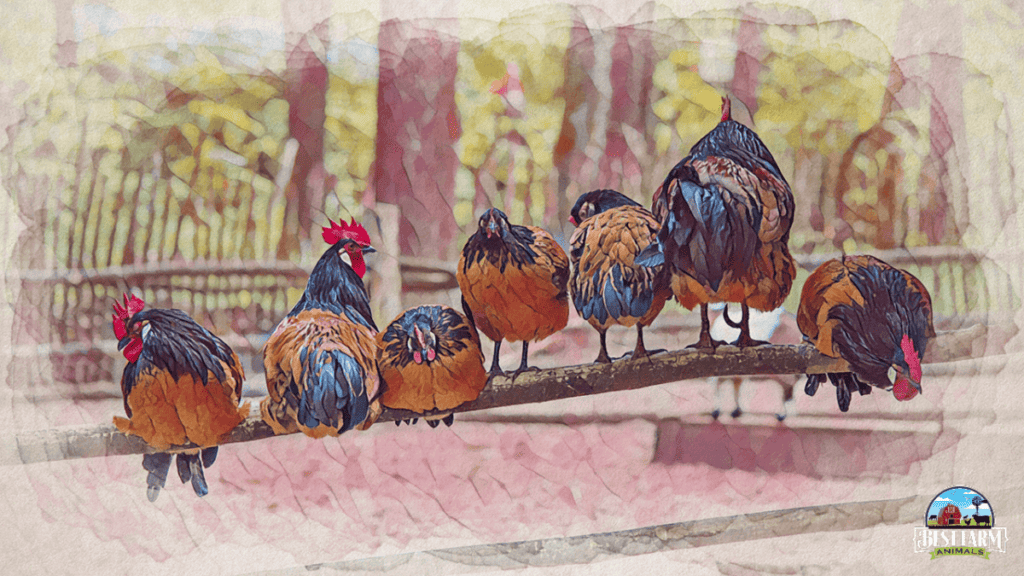When I first started out as a farmer, I thought my green thumb for crops would naturally extend to rearing animals. Boy, was I wrong!
I’ll never forget the morning I awoke to find my first brood of chickens looking more listless than lively. It was a tough lesson learned, but one that set me on the path to becoming a more informed and responsible farmer.
One of the most critical areas I delved into was how to keep chickens healthy – what diet to provide, which vitamins they need, and the impact of these on their overall health.
Skip Ahead
What do chickens need to be happy and healthy?
To keep chickens happy and healthy, they require a balanced diet, including commercial feed and fresh produce, alongside access to clean water. Healthy chickens also need a well-ventilated, spacious coop, a safe outdoor space, regular healthcare, and the companionship of a small flock. Fulfilling these needs ensures their well-being and productivity.
There are many factors to consider and give to raising healthy chickens. If you’re also confused about what to provide for your flock, read this article below!
5 Things YOU Should Know To Keep Chickens Healthy
As a farmer, you need to know the basic needs of a chicken to raise healthy, happy chickens. The hen’s diet isn’t the only thing you should research about.
Below are the most important things chicken needs daily.
1. Chickens Need Proper Nutrition, From Chick to Hen or Rooster
Chickens need a balanced diet of grains, vegetables, and quality poultry feed, including necessary vitamins and minerals. A chicken’s diet should consist of about 90% commercial feed formulated with all the required nutrients.
The remaining 10% are food treats such as fruits, vegetables, and worms.
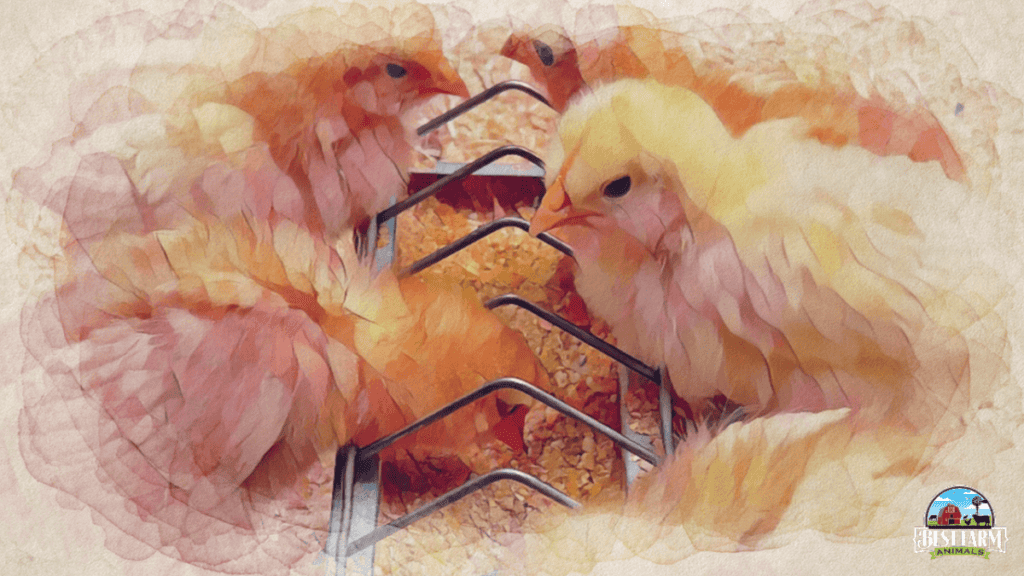
Healthy Chickens’ Diet Must-Haves
| High Vitamin Foods for Chickens | Leafy Greens: Rich in vitamins A and E, promoting good eyesight and a strong immune system. Berries: Packed with vitamin C and antioxidants that help fight diseases. Seeds and Grains: Source of B vitamins which are essential for energy production. |
| Best Protein for Chickens | Mealworms: A favorite chicken snack packed with protein. Fish: Cooked fish like tuna and mackerel are a great protein source. Legumes: Boiled lentils and chickpeas can provide a plant-based protein boost. |
| Food to Make Chickens Grow Faster | Quality Poultry Feed: Designed to meet all their nutritional needs for optimal growth. Grains: Foods like corn, wheat, and oats provide energy for growth. Fresh Fruits and Vegetables: Provide necessary vitamins and nutrients. |
| Vegetable Protein for Chickens | Lentils: Cooked lentils are an excellent source of plant-based protein. Peas: Raw or cooked; they’re a good protein source, and chickens love them. Cooked Soybeans: High in protein but should always be cooked to remove harmful substances. |
| Calcium-Rich Food for Chickens | Crushed Eggshells: A cost-effective and natural way to supplement calcium. Oyster Shell: Available at feed stores, this is a classic chicken calcium source. Dairy Products: Foods like cheese and yogurt can provide a calcium boost. |
| To Boost Chicken Immune System | Garlic: Known to have anti-inflammatory and immune-boosting properties. Apple Cider Vinegar: Added to their water, it can help maintain gut health. Probiotics: Found in fermented foods, these support a healthy digestive system. |
| For Healthier Eggs | Flaxseeds: They increase the level of omega-3 fatty acids in the eggs. Vitamin-Rich Foods: Berries, leafy greens, and grains promote overall hen health, leading to healthier eggs. High-quality Layer Feed: Specially designed to provide hens with the nutrients they need for egg production. |
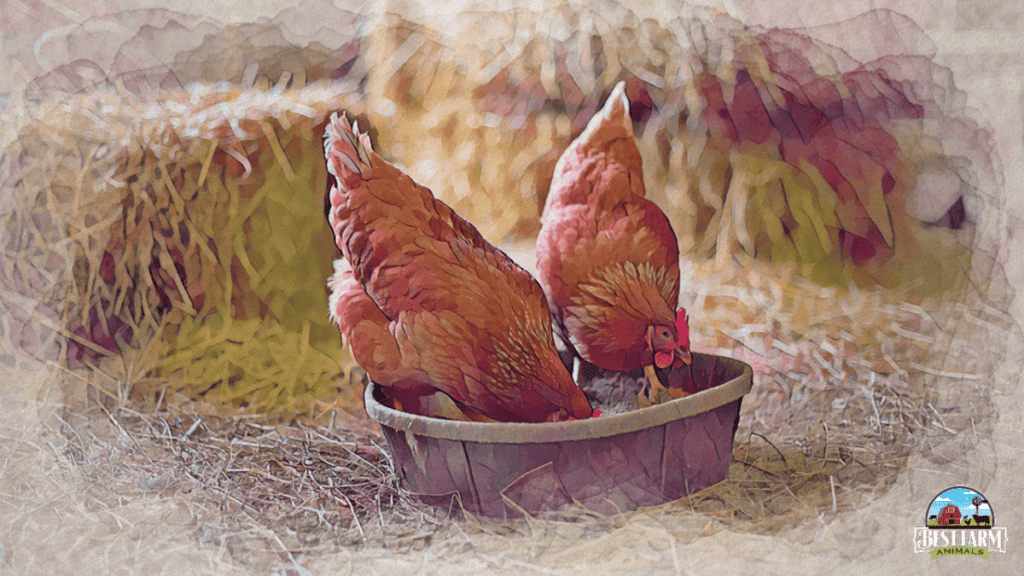
2. Provide Chickens With Fresh, Clean Water Every Day
Always ensure that your chickens have access to clean, fresh water. Water is crucial for their digestion and egg production.
To make chickens well, a tablespoon of apple cider vinegar per gallon of chicken water can help with their digestion and immunity.
Ginger, lemongrass, and turmeric, known for their anti-inflammatory and immune-boosting properties, can also be used. A teaspoon of freshly grated ginger, turmeric, or a few lemongrass leaves per gallon, should suffice.
Moreover, oregano oil, a natural antibiotic, can be added to the chicken’s water too, but remember to use it sparingly – a few drops in a gallon of water is plenty.
Remember that any changes to your chickens’ diet should be introduced gradually and monitored for any potential reactions. If in doubt, it’s always best to consult with a vet.
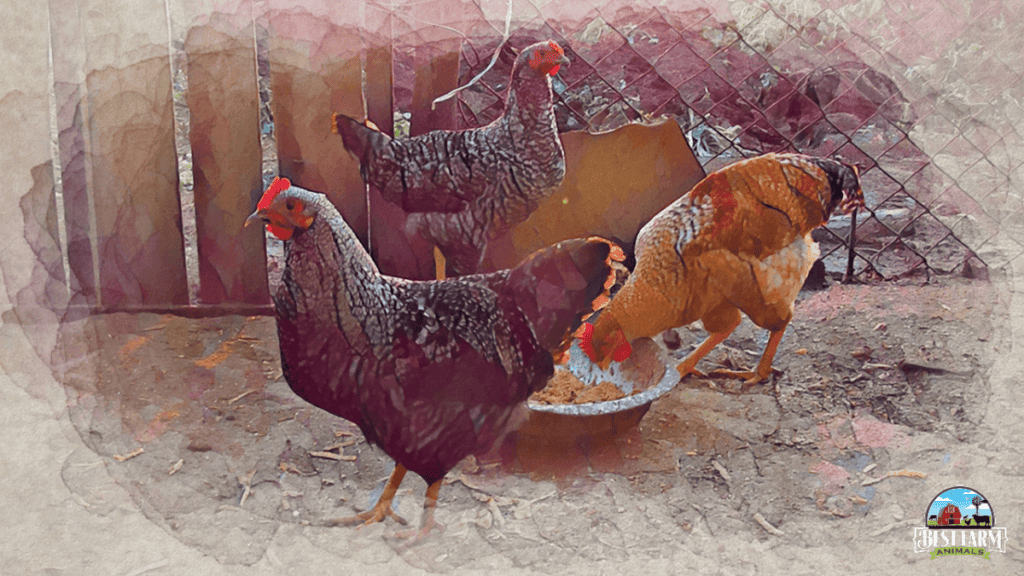
3. Comfortable Coops Keep Healthy Chickens
A spacious, clean, ventilated coop is paramount to healthy chickens. Each chicken needs about 4 square feet of space. You can also try the chicken coop deep litter method for your flock.
Coops should also be predator-proof and provide roosting bars for the chickens to perch during the night.
For their mental health, chickens benefit from enrichment activities. Here are a few suggestions:
- Perches and Roosting Bars: Chickens enjoy perching on elevated places. Installing various heights of perches can encourage this behavior and promote physical activity.
- Dust Baths: Chickens love to dust bathe. It’s how they naturally keep their feathers clean and free from parasites. Provide a designated area in their coop or run filled with a mix of sand and diatomaceous earth.
- Pecking Toys: There are many pecking toys available in the market. These toys often dispense food slowly, which not only keeps them busy but also helps to prevent overeating.
- Foraging Area: If your setup allows at home, providing an area where chickens can scratch and forage mimics their natural behavior. You can scatter scratch grains, seeds, or mealworms to encourage this. It’s also better for them to be free ranging chickens.
- Paddling Pool: In warmer months, a shallow pool with a couple of inches of water can help chickens cool off and provide entertainment.
- Mirrors: Chickens are curious creatures, and a small, sturdy mirror can provide amusement. However, use caution as some chickens might react aggressively towards their own reflections.
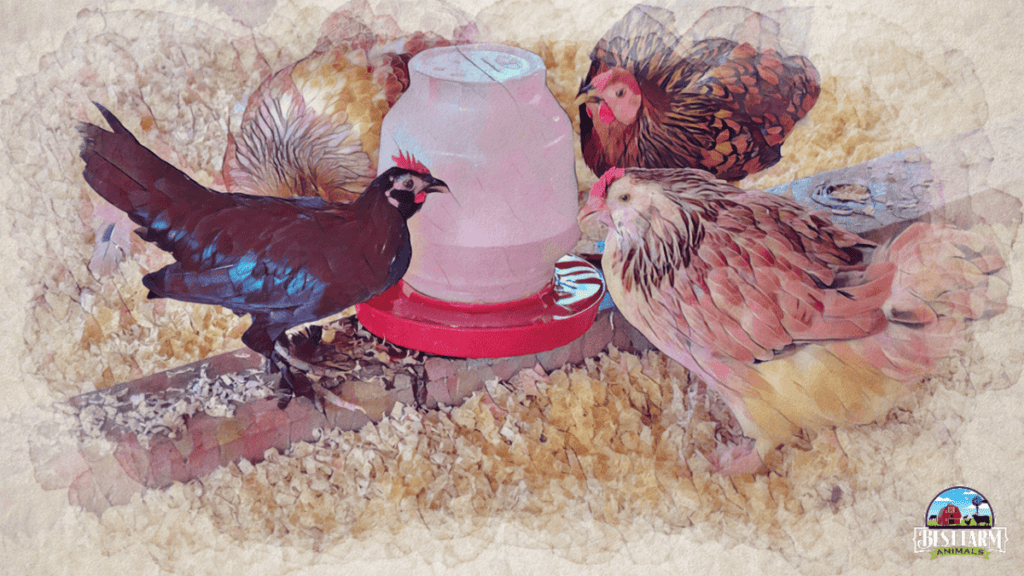
4. Healthy Chickens Require Health Maintenance, Deworming
Regular vet check-ups, deworming, and vaccinations are a must to keep diseases at bay when you have chickens. It’s also important to watch for any signs of distress or illness, as chickens can hide their symptoms well.
Deworming chickens involves providing them with food-grade diatomaceous earth or pumpkin seeds in their feed, both of which are natural methods to control internal parasites.
To prevent external parasites, keep their coop clean and provide areas for dust baths filled with sand and diatomaceous earth.
For a more conventional approach to illness, a vet should ideally prescribe the best antibiotic for chickens, considering the specific ailment and the individual bird.
The best disinfectant for chicken coops is a vet-approved or poultry-safe disinfectant, eliminating pathogens without harming the flock.
Disease prevention revolves around maintaining cleanliness, ensuring proper coop ventilation, a balanced diet, and practicing biosecurity, like quarantining new chickens before introducing them to the flock.
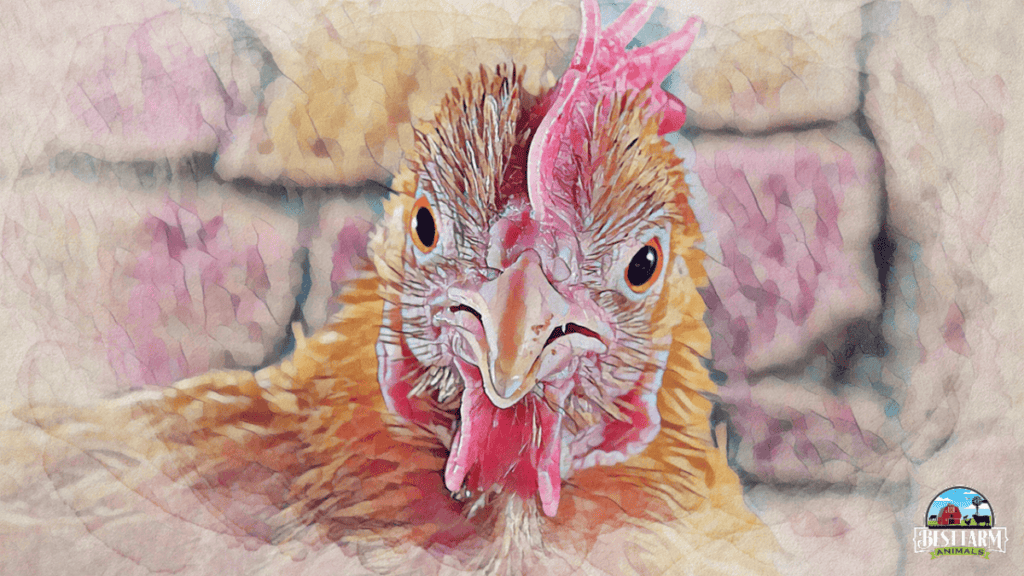
5. Keep At Least Three Chickens Inside a Coop to Make Them Happy
Chickens are social creatures and thrive in a flock. Keeping at least 3-6 chickens together helps them feel safe and content.
In particular, farm-raised chickens, those reared in a well-managed environment, can be very healthy. Their health directly results from their diet, living conditions, and veterinary care.
Access to outdoor space allows them to exercise and engage in natural behaviors, which benefits their physical and mental health.
The “healthiest” chickens would be those with a well-balanced diet, ample living space, regular health checks, and a stimulating environment. Breeds don’t necessarily dictate health, as it depends on their care and upbringing.
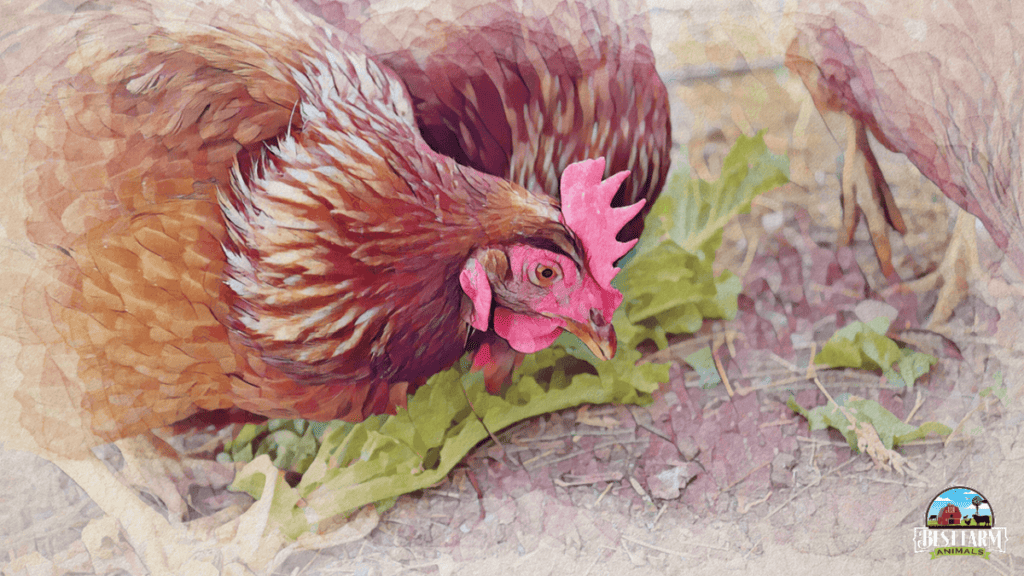
How to Naturally Keep Chicken Healthy at Home
Keeping chickens healthy naturally is a task that combines balanced nutrition, proper coop maintenance, and the use of herbs known for their health-boosting properties.
You’d be surprised how much a sprinkling of herbs in the coop or their feed can contribute to your flock’s well-being.
For example, herbs like oregano, thyme, and garlic are wonderful for chickens. Oregano, in particular, is often referred to as the best herb for chickens due to its antibacterial and antiparasitic properties. It’s like a natural antibiotic, preventing various diseases and promoting good gut health.
Egg production can be positively influenced by herbs as well. Parsley and calendula are known for this; parsley boosts egg-laying, and calendula can enrich yolk color.
As for natural antifungal solutions, consider apple cider vinegar in their water or cinnamon in their feed – both have antifungal properties.
And let’s not forget aloe vera, which is excellent for chickens. Its gel can soothe minor skin irritations and wounds. A testament to nature’s pharmacy, indeed!
So there you have it. We can ensure our feathered friends thrive naturally with the right mix of nature’s offerings and attentive care.
How To Tell if a Chicken is Healthy (And Happy)
If you’ve already done the steps above, let’s now find out how to identify if your chickens are healthy living in their coop.
Healthy Chicken Is Active and Social
Healthy chicken behavior involves being active, curious, and social. They should display a keen appetite and drink plenty of water.
Good health signs include bright, clear eyes, clean feathers, and an erect comb that’s the appropriate color for their breed – typically bright red. Chickens should also move with agility and exhibit natural behaviors like dust bathing, pecking, and scratching.
Healthy Diet Impacts Chicken Poop Color
The feces of a healthy chicken can vary in color, but typically it should be firm and brown with white urates. Do note, however, that diet can impact feces color.
Healthy Chicken Eggs Have Bright Yolks Inside
Healthy chicken eggs have firm, bright yolks and a viscous, not runny, egg white, or albumen. The shell should be uniformly shaped and free of cracks or abnormalities.
If you’re checking fertilized eggs for health, you can use a candle to check them. A viable egg viewed under candling should show clear signs of embryonic development.
How To Keep Chickens Healthy FAQs
Do chickens need sunlight?
Yes, chickens do need sunlight. Sunlight exposure is vital for their health as it aids in Vitamin D synthesis, which is crucial for calcium absorption and healthy eggshell production. It also contributes to their overall well-being and mood.
Are sardines good for chickens?
Sardines are indeed good for chickens in moderation. They’re a fantastic source of cheap protein for chickens and omega-3 fatty acids. Just ensure they are cooked and served in small pieces to avoid choking hazards.
Is rice good for chickens?
Rice, especially brown rice, can be a good part of a chicken’s diet. It’s packed with nutrients, and chickens generally like it. However, avoid giving chickens uncooked rice as it can be hard for them to digest.
As for Quaker Oats, chickens can eat them and often enjoy them. Oats are a great source of nutrients and can be a warming food during colder months.
My Favorite Chicken and Duck Supplies
This list contains affiliate products. Affiliate products do not cost more but helps to support BestFarmAnimals and our goal to provide farm animal owners with accurate and helpful information.
Manna Pro Oyster Shell keeps eggs strong. Before I gave my chickens oyster shell, I had the oddest eggs, many with weak and irregular shells. Now, I don’t have an issue.
Layer Feed by Manna Pro. I like pellets rather than crumbles as my chickens eat them better and less gets wasted or scavenged by rodents. A good layer feed makes the difference in hens laying many more eggs.
My chickens love this mealworm treat, which gives added protein, something that’s great during molting and winter months.
There are many ways to feed and water your chickens. I like this food and water setup the best because it reduces waste, saves me time feeding and watering, and keeps the food fresh longer. Except, in the winter, I use a heated waterer. The only problem is the heated waterers need to be replaced every few years.
I love this chicken veggie hanger. It makes it easy to give your chickens produce from the garden and keep them occupied in the winter with a fresh head of lettuce.
These chicken toys are a hoot! They will help curb bullying and keep your chickens active, especially in the winter when hens tend to get more lethargic.
Conclusion
Keeping chickens healthy naturally hinges on balanced nutrition, comfortable living conditions, and attentive care.
Remember, the foundation of their diet should be high-quality poultry feed supplemented by a variety of safe fruits, vegetables, and grains. Adding herbs can provide numerous health benefits and even enhance egg production.

